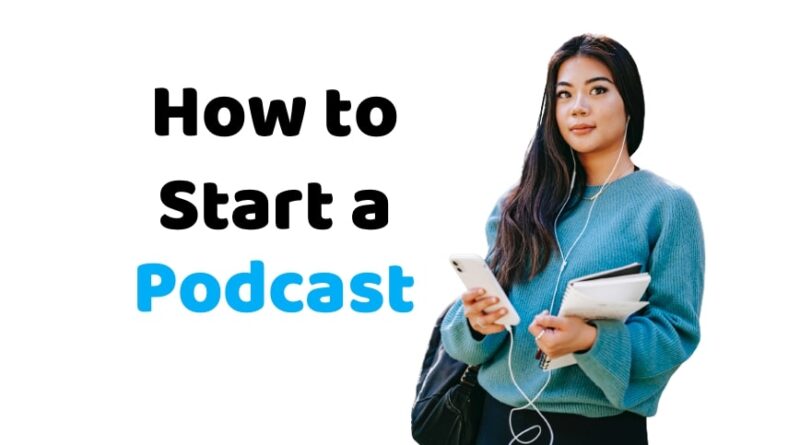How to Start a Podcast
How to Start a Podcast? If you are interested in starting your podcast, you must begin with the basics. Many people think they need a big idea and audience before creating their podcast, but that is not true. All you need is something to say and a way to say it.
How to Start a Podcast
Podcasts are great for getting information about a topic you care about. They can be listened to on the go or while you do other things. Podcasts are available on every media player, including your car stereo, phone, and tablet.
1)- Pick a Genre
The first step is to decide what kind of show you want to do. Many different types of podcasts are available online today, and they all have their benefits and drawbacks.
You can choose from talk shows, interviews, storytelling podcasts, or even podcasts that focus on a specific topic like science or comedy.
A)- Specific Topic
Make sure you have a specific idea for what you want people to get out of their time with your podcast by speaking about meaningful topics, taking actionable advice, and connecting with like-minded listeners!
B)- Clear Message
A great podcast needs to have a clear message, and it needs to be succinct. It’s crucial to keep the topic focused. This way, listeners will know what they’re getting into and will be able to decide if they want to listen or not.
C)- Build a conversation
Podcasts are an excellent way to connect with a niche audience conversationally. This can be done by creating episodes on the topics of a niche industry, interviewing experts in that industry, or hosting general interest conversations about the niche topic.
D)- Easy and Favorite Topic
You should find a topic you’re passionate about, as this will make it much easier for you when it comes time to create content. The reason is that passion is contagious, and listeners want content from people who are passionate about the topic they’re talking about.
E)- Create an Outline
It would be best to create an outline and stick to it when creating your podcast episodes. This will make it much easier to finish your podcast since you know exactly what your content will be.
2)- Hunt an appropriate platform
The next step is finding an appropriate platform for your show. Many different platforms for hosting podcasts offer additional features such as monetization options or cross-promotion.
If you are starting, though, it is best not to get too involved in the technical aspects of your podcast and focus on getting content out there instead.
Finding the perfect platform for you will depend largely on your current skill set and the type of show you want to do. You can use free sites to host podcasts like Blog buzzsprout or SoundCloud.
There are also paid services like Libsyn, which offer many different features but cost a monthly subscription fee for hosting your show.
3)- Choose Suitable Devices
Arrange a set of devices as below:
A)- Quality Microphone
Get a good quality microphone. The first thing that you will need is a microphone. A USB microphone will be sufficient for most podcasters and can be plugged into your computer.
You can also purchase a stand for the mic, which is unnecessary for most people. Another option is to use an XLR microphone which requires more equipment but offers higher quality sound.
The best type of microphone for voice is the built-in microphone that most laptops use. However, if you want to record higher-quality sound, you can buy a USB microphone on Amazon.
B)- Audio Interface
Next, you will need a mixer or audio interface to plug in your mic and other audio sources (like speakers or music). But, again, you don’t want to plug these devices indirectly because they are sensitive pieces of equipment and could easily be damaged by static or interference from other electronic devices in the room.
C)- Headphone
A good set of headphones is an essential piece of equipment. You want to hear how your voice sounds in your headphones so that you can make any necessary adjustments before recording.
D)- Computer and Audio Software
The last thing you will need is a computer and software to record the podcast. Instead, get some basic editing software like Audacity and use it on your recordings before publishing them, so they sound better and more professional.
Make sure you have an intro, outro, and bumper music that connects the story of your podcast and sets the mood throughout.
Edit releases well before publishing them so they are clear and concise so people can clearly understand what you’re saying.
E)- Recording Device
When creating a podcast episode, it would be best to record yourself so listeners can hear your voice and connect with who is talking. This will also help you ensure that the content’s sound quality is good enough for people to understand. This will also make it easier to find any glitches in your episode.
Sound quality is the key. When creating a podcast, the sound quality must be good since listeners will want to enjoy the content and not have to work hard to understand what is being said. This will also make it easier for people to enjoy the podcast and be able to find you on iTunes.
4)- Select a Quiet place
Find a quiet place to record your podcast. Podcasting is a great way to share your thoughts with the world. But recording podcasts in public spaces can be difficult because you’re always surrounded by noise and distractions.
A good place to record your podcast would be in a quiet environment, where there are no outside noises or distractions.
Therefore, the best place for you to record your podcast would be in an area that is not too noisy, such as your home office or library. You can also use a sound-proof booth if you have access to one.
5)- Comfortable Chair and Table
Find a comfortable chair, and make sure you have access to water and snacks while recording your show. A comfortable chair is important because it can help make your voice sound better and make your podcast more enjoyable.
If you’re not comfortable with what you’re sitting on, then it will be very hard for your audience to be comfortable listening to what you have to say.
A table or desk is essential for two reasons: it can make a conversation more natural and personal, and it prevents you from slouching. Slouching is uncomfortable for listeners and makes the conversation less professional.
Once you’ve found a free spot in a coffee shop, remember to get up and move around every 20-30 minutes during your recording session. This will help avoid sounding like you’re talking in circles or from the same place all the time.
6)- Number of Episodes
Set goals for the number of episodes you want to produce in a week, month, or year and then stick to them! If you want to be successful with your podcast, it is important to be consistent.
One of the most effective ways to keep your listeners coming back for more is by telling an engaging story weekly. In addition, if you are going to be away from your podcast for a longer period, let listeners know in advance and give them a date when they can expect the next episode.
Publish your podcast on a consistent schedule, and announce the release dates in advance so people know when they can expect new episodes!
7)- Decide a Theme Song
Podcasts are a great medium to express your thoughts and ideas. However, to make your podcast more memorable, it is important to have a theme song. This will give your listeners something to associate with your podcast.
Please choose an appropriate theme song for your podcast that will represent the mood of what you’re talking about in each episode so people can recognize it when they hear it on their commute or wherever they are listening from!
Themes songs can be instrumental, or they can be lyrics. However, the most popular theme songs are usually the ones that are catchy and easy for the listener to remember.
You should also make sure that you have a different theme song for each season of your podcast so that listeners always know when new episodes will be released if it is not announced in the episode title or description.
8)- Create an Authentic Brand
To have a successful podcast, you need to establish an authentic brand. The best way to do this is by creating a niche and sticking with it. It’s important that your content is consistent and not too generalized regarding the topics you’re discussing.
Podcasting is all about telling a story. You want to be as authentic as possible and make sure your listeners feel connected to you.
It would help if you were yourself when you were on the air. This is the best way to connect with your audience and build a loyal following who will come back for more episodes of your podcast.
9)- Keep it Short
There are many ways to have a successful podcast, but one of the most important things is not to keep it too long. Longer episodes can lead to listeners losing interest, but shorter episodes are better for engagement.
10)- Consistent Tone
One of the best podcasting tips is to have consistency in your voice. For listeners, this means that when they hear a podcast, they can identify it as yours because it will have a recognizable tone.
Conversely, if you do not have a voice that can be easily identified, your listeners may not come back to your show.
Conclusion
Audio podcasts are a great way to share your voice and knowledge. It is a valuable resource for people who want to learn something new or reinforce their existing knowledge. Here are six simple steps you can use to create an audio podcast:
– Decide on the topic, content, and length of your podcast
– Find a recording space that is free from any noise
– Record your audio podcast by speaking into your computer’s microphone
– Edit the recording by removing any unwanted noise or long pauses
– Upload it to a hosting service like Soundcloud or Libsyn
– Create a podcast feed on your blog or website and announce it through social media
Related Posts:
2)- Best Time to Post on Instagram
3)- Best Time to Post on Facebook
4)- Best Time to Boost on Tinder
8)- Business Plan Writing for Your Startup
9)- How to Choose a Business Name?
11)- Top 10 Affiliate Programs and Platforms
12)- What is Affiliate Marketing
13)- How to Start Your Freelance Writing Career
14)- SEO Courses
15)- SEO Platforms




